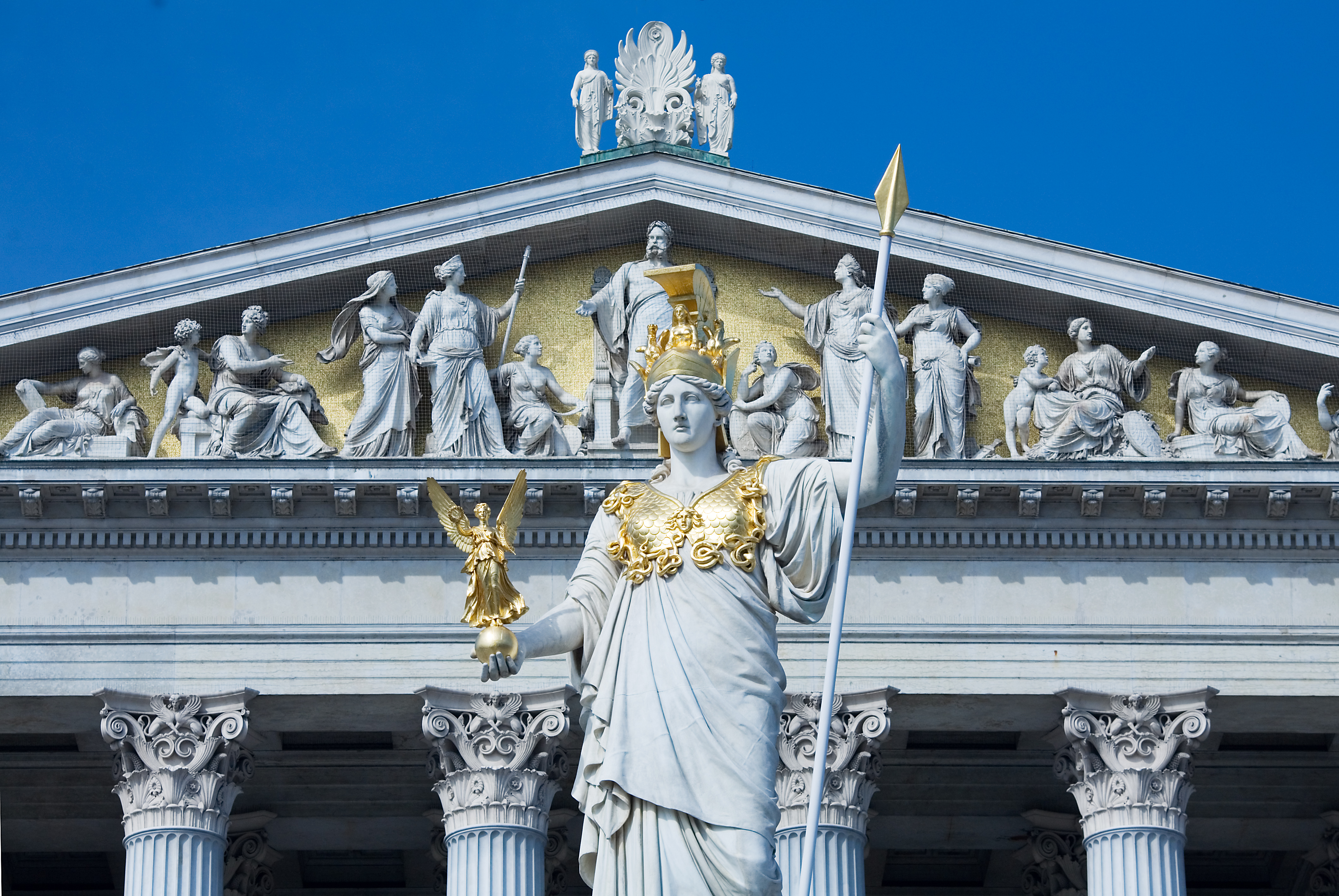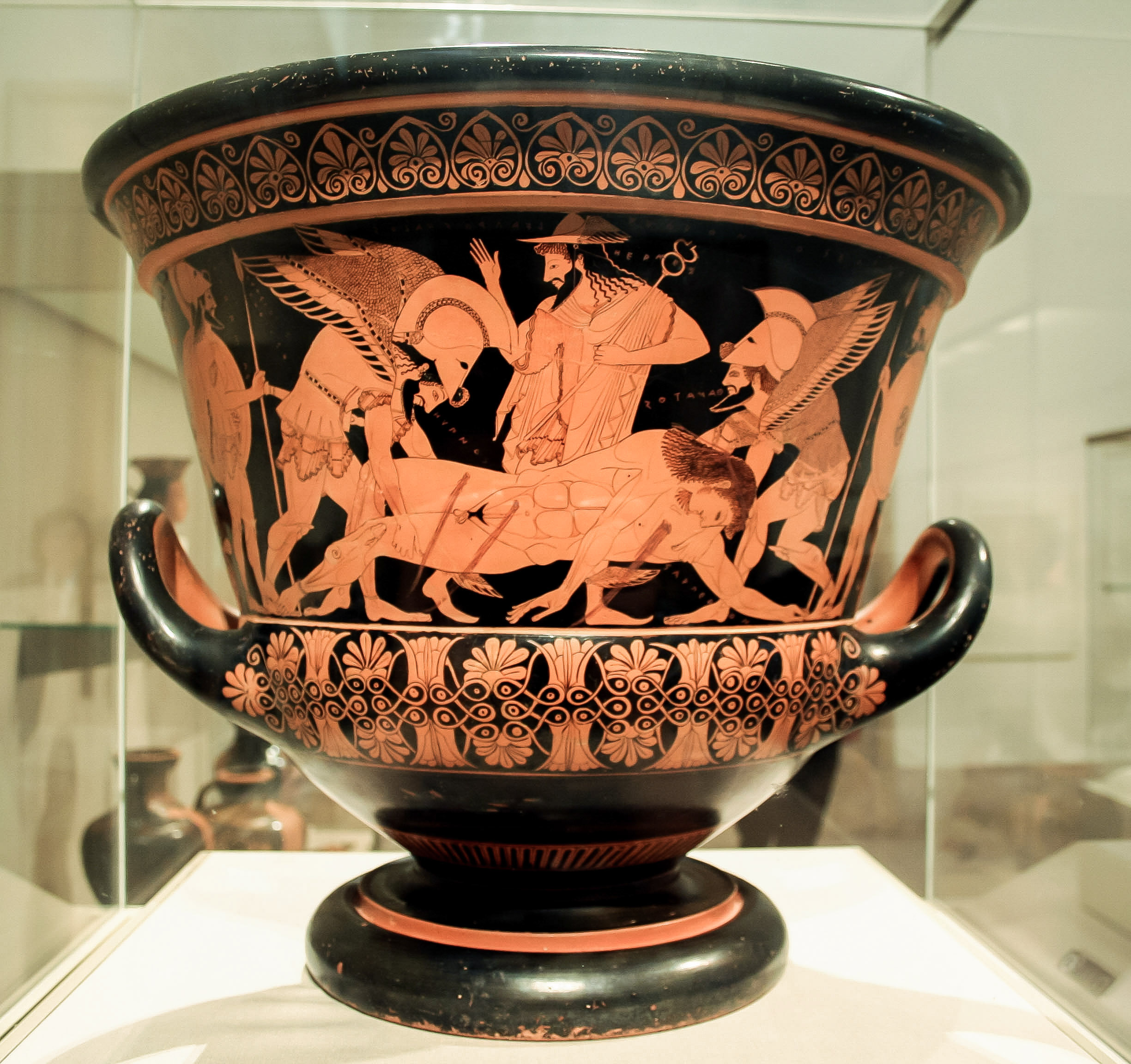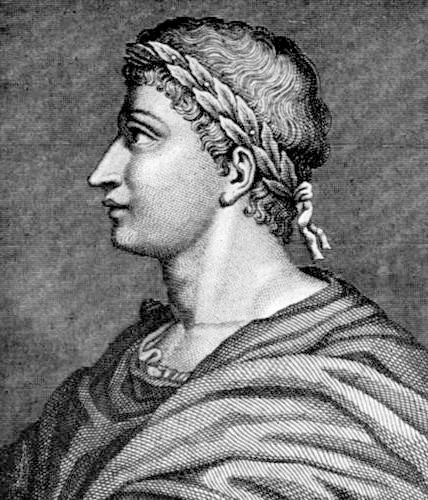Unit 1: Why Study Greek Mythology?

3. Skim the next reading. What do you think is the author’s purpose of the text: to inform, entertain, or to persuade? How will that affect the way you take notes on the reading?
Vocabulary in Context
These sentences are from the next reading. As much as possible, you should guess vocabulary while you read and avoiding using the dictionary unless you feel you don’t understand the material. Use the context of the topic and the sentence to guess the meaning of the words in bold.
- Myths are universal. Virtually all cultures have them.
- …many adherents of religions view their religion’s stories as true and therefore object to the stories being characterized as myths.
- They were polytheistic, meaning they believed that there were many gods, overseeing virtually every aspect of life – darkness, love, pain, vengeance…
- Socrates was sentenced to death and forced to poison himself.
- By the late 200s CE, many of the elites of the Roman Empire had converted to Christianity, causing the Greek religion’s final decline.
- Some thinkers claimed that myths result from the personification of objects and forces.
- The ancients worshiped natural phenomena, such as fire and air, gradually deifying them. For example, according to this theory, ancients tended to view things as gods, not as mere objects.
- Some, especially early on, were tolerant of other religions, even mixing local religious festivals with Christian ones in the hopes of converting pagans to Christianity.
Why Study Greek Mythology?
by Charity Davenport
This article uses material from the Wikipedia article “Myth,” $\ccbysa$
What is a Myth?
Myths are universal. Virtually all cultures have them. But what is a myth? The word “myth” has two very different meanings here, one of which we will be using more often in the context of this textbook. Most people will say that the word “myth” means that something is not true. Many will argue that Greek Mythology is the study of the stories that come from an ancient, dead religion that died because people learned that the stories are not true. But this is actually a twisted definition of the word “myth,” which in Greek just means “story”. Usually we consider myths to be stories that contain religious or magical elements, more specifically narratives or stories that play a fundamental role in a society, such as foundational tales or origin myths. The main characters in myths are usually gods, demigods, or supernatural humans. Under this definition of myth, that means that stories from the Bible and the Quran also contain myths. This idea might make some feel uncomfortable, as if the stories so important to their religion were untrue. Since the term myth is widely used to imply that a story is not objectively true, the identification of a narrative as a myth can be highly political: many adherents of religions view their religion’s stories as true and therefore object to the stories being characterized as myths. But here, “myth” just means “story,” usually one that has been passed down for hundreds of years that held very significant meaning to ancient society and continues to hold significant meaning to current society. Labeling all religious narratives as myths can be thought of as treating different traditions equally.
The History of Greek Mythology
The stories that make up Greek mythology, which is the study of Greek myths, have been around for thousands of years. Many have been lost due to wars or destroyed over time, especially since many of the stories were only passed on through oral traditions. This also means that there may be many versions of the same Greek myth.
The Greeks had a very different idea of god than Abrahamic religions. They were polytheistic, meaning they believed that there were many gods, overseeing virtually every aspect of life – darkness, love, pain, vengeance, and especially ruling over nature, such as gods or other magical beings who belong to the sun, the moon, the sea, trees, flowers, and the animals. In this way, the ancient Greeks tried to make sense of natural events around them before the discovery of science – why earthquakes happened, why the sea tossed angrily, why there were storms or cold winters – were probably the doings or punishment from the gods, to the ancient Greeks.
Another difference is that the ancient Greek gods were very imperfect and not always fair. They made mistakes, fell in love, were jealous, and made trouble, just as humans do. Many of the gods or magical beings could shape-shift, meaning they could become an animal or another person. But the most important thing is that humans should know their place. Just because the gods seem like humans doesn’t mean they are on the same level. Not respecting the gods could cost a human their life.
There’s not a lot of information about when this Greek religion began, but many works were created during the 7th to 2nd Centuries BCE. Before then, illustrations of story events were found on vases as early as 9th Century BCE. One famous author is Homer – although no one is sure if he really existed or if more than one person wrote Homer’s famous epic stories The Iliad, about the Trojan War, or The Odyssey, about one man’s journey home after that war. Plays were very popular in ancient Greece, with many performances being written by Sophocles and Euripides during the 4th Century BCE.

Starting in the 3rd Century BCE, the Greek religion faced a decline. At this time, Greek thought began to expand. This period brought about philosophers, doctors, and others who were questioning what was happening in their lives. They did not necessarily think that bad things happened because humans were being punished by the gods. For example, Hippocrates, known as the “Father of Medicine”, noticed that people were getting sick from unsanitary conditions and eating unhealthily – not because the gods were punishing them. The famous philosopher Socrates created “Socratic Questioning” around this time, where in order to get answers, one must ask questions. Socrates became a powerful philosopher, and many religious and political figures did not like that. He eventually was arrested and charged with corrupting the minds of the people and with heresy, which means not believing in the state religion. Socrates was sentenced to death and forced to poison himself.

Once the Roman Empire took over Greece in 146 BCE, the decline continued. However, the Romans borrowed much of the Greek religion and art styles of the time. This is why many of the gods in Greek mythology also have a Latin, or Roman name as well. For example, you may know the goddess of love in Greek as Aphrodite, but in Latin as Venus. They even introduced their own gods that interacted with the Greek ones, such as Janus, the god of doors, which is where get the month of January from. Around the first century CE, Ovid wrote his famous book The Metamorphoses, which focuses on transformations in nature, and Virgil wrote The Aeneid, the story of the founding of Rome, from 29 to 19 BCE. Both were written in Latin and are important sources of mythological stories.

By the late 200s CE, many of the elites of the Roman Empire had converted to Christianity, causing the Greek religion’s final decline. Different kings and emperors of this time had different rules for those who prayed to pagan, or non-Abrahamic, gods. Some, especially early on, were tolerant of other religions, even mixing local religious festivals with Christian ones in the hopes of converting pagans to Christianity. This is why many Christian holidays like Christmas and Easter have non-religious customs, such as decorating trees inside the home and gift-giving for Christmas, and egg and rabbit designs celebrating renewed life in spring for Easter. But by the late 300s CE, many people were persecuted for being pagans. By the 500s, the Greek pagan religion all but disappeared.
But for some reason, maybe it’s the colorful characters, maybe it’s the drama, maybe it’s the stories of love, adventure, and of universal human emotions that transcend time and space, the stories of this religion have been revived every few hundred years, and are still popular today. It is interesting to note that ancient Greek playwrights were not expected to faithfully reproduce traditional myths when adapting them for the stage. They were instead recreating the myths and producing new versions to entertain audiences, and to this day writers are inspired by Greek myths and creating their own entertaining works from them. Many middle and high schools in the US and UK require students to read and study these ancient stories as part of their literature courses. And thus it is important for students of the English language, too, to become familiar with these stories.
Why Study Greek Mythology?
Stories from ancient Greece have been a subject of deep academic study for many years now. Scholars who study comparative mythology have found many universal themes in world mythologies that help explain the staying power of these stories. Some believe that these stories were told to establish models for moral behavior, both by showing what was favorable and what punishments some received after doing immoral actions. One theory claims that myths are distorted accounts of historical events. According to this theory, storytellers repeatedly elaborate upon historical accounts until the figures in those accounts gain the status of gods. This theory is named euhemerism after mythologist Euhemerus (c. 320 BCE), who suggested that Greek gods developed from legends about human beings. Some theories propose that myths began as allegories for natural phenomena: Apollo represents the sun, Poseidon represents water, and so on. According to another theory, myths began as allegories for philosophical or spiritual concepts: Athena represents wise judgment, Aphrodite desire, and so on. Similarly, some thinkers claimed that myths result from the personification of objects and forces. According to these thinkers, the ancients worshiped natural phenomena, such as fire and air, gradually deifying them. For example, according to this theory, ancients tended to view things as gods, not as mere objects. Thus, they described natural events as acts of personal gods, giving rise to myths.
A famous psychologist named Carl Jung (1875-1961), whose work has been influential in not only psychiatry but also anthropology, archaeology, literature, philosophy, and religious studies, believed that myths and dreams were expressions of the “collective unconscious”, in that they express core ideas that are part of the human species as a whole. In other words, myths express wisdom that has been passed down for generations, perhaps by means of evolution or through some spiritual process. For Jungians, this common origin in the collective unconscious explains why myths from societies at the opposite ends of the earth can be strikingly similar. A Jungian analysis of classical mythology would claim that the main gods and goddesses express archetypes, or common human characteristics, that are common to human thinking everywhere. For him, studying stories from the past helps us learn about the human experiences we have today.
Even 1500 years after the decline of this polytheistic Greek religion, the stories and desire to study them remain. References to Greek mythology can be found virtually everywhere – in art, architecture, language, literature, music, and culture in much of the US and Europe. The beauty of the stories has inspired generations of people around the world to create. JK Rowling, the author of the famous Harry Potter book series, earned a degree in Classics, the study of Greco-Roman history and culture. Sculptures and art made hundreds of years ago or even two days ago could be inspired by a story from Greek mythology. And even the words we use in English have connections to these ancient stories. Is that true for stories in your language as well?
Comprehension Questions
Using your own words, answer the questions below according to the reading. Make a note of where you found the answer in your reading.
- What is the difference between the two definitions of the word “myth”?
- Why did the Greeks create these stories?
- What two major events caused the decline of the Greek religion?
- When was the official end of the ancient Greek religion?
- What are five theories (or themes) of comparative mythology that are explained in the reading?
- Why is Greek mythology important for students studying English?
Critical Thinking: From My Experience
Think about a folktale or ancient story from your culture that is still told today. Answer the following questions about the story.
- Write a summary of the events of the story.
- What is the important message of the story? Does it teach a lesson?
- Are there any holidays or festivals related to this story? Explain if yes.
- Is this story still used in popular culture? Explain if yes.
- Are there art, sculptures, or statues about this story?
- Has this story created any vocabulary or idioms still used in your language? Give the vocabulary and explain the meaning if yes.
Once you are finished with this reading, skim the next one. What do you think is the author’s purpose of the text: to inform, entertain, or to persuade? How will that affect the way you take notes about the reading?
CEFR Level: CEF Level Low B2
- Image credits for "Before You Read" exercise: Harry Potter: by OpenClipart-Vectors on pixabay, $\cczero$ • Versace logo: by Shawn Harquail on Flickr, $\ccbync$ • statue of Atlas: by Lawrence OP on Flickr, $\ccbync$ • Starbucks sign: photo by CharityDavenport, $\ccbyncsa$ • Wonder Woman figure:by Brickset on Flickr, $\ccby$ • Nike shoe: by Scott Ritchie on Flickr, $\ccby$ • Olympic rings: by Alistair Ross on Flickr, $\ccby$ • Prometheus at Rockefeller Center: by Son of Groucho on Flickr, $\ccby$ • Pandora jewelry box: by yun. on Flickr, $\ccbynd$ ↵











